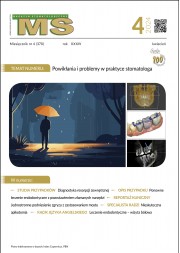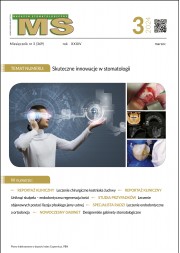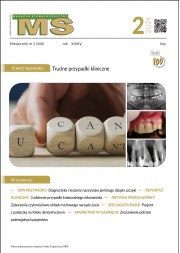Dostęp do tego artykułu jest płatny.
Zapraszamy do zakupu!
Cena: 5.40 PLN (z VAT)
Kup artykuł
Po dokonaniu zakupu artykuł w postaci pliku PDF prześlemy bezpośrednio pod twój adres e-mail.
Justyna Klepacz-Szewczyk i Halina Pawlicka
Wstęp. Kobieta ciężarna w swoim szczególnym stanie fizjologicznym powinna być objęta kompleksową opieką lekarską zarówno ze strony lekarza ginekologa, jak i lekarza dentysty. Zmiany zachodzące w organizmie w czasie ciąży sprzyjają rozwojowi stanów patologicznych w jamie ustnej.
Cel pracy. Ocena stanu zdrowia jamy ustnej pacjentek Instytutu Centrum Zdrowia Matki Polki (ICZMP) w okresie okołoporodowym. Analiza zachowań prozdrowotnych kobiet ciężarnych.
Materiał i metody. Przeprowadzono badanie ankietowe i kliniczne 70 pacjentek z ICZMP. Analizowano wartości wskaźników zapadalności na próchnicę oraz potrzeb periodontologicznych.
Wyniki. Wśród przyszłych matek 35% ograniczyło wizyty u dentysty z powodu ciąży, a 30% nie odwiedziło gabinetu stomatologicznego. W większości (92%) kobiety ciężarne wybierają prywatny gabinet dentystyczny. Średnia wartość wskaźnika PUW wśród zbadanej populacji wynosi 12,3 (Me 12). Natomiast wg wskaźnika CPITN do kategorii potrzeb leczniczych zaliczono 43% kobiet, a 29% do kategorii II. Respondentki w 78% szczotkowały zęby dwa razy dziennie oraz stosowały płyn do płukania jamy ustnej (54%) i nitkę dentystyczną (42%) jako dodatkowe metody higienizacji. Prawie 2/3 uczestniczek badania uważa stan swojego uzębienia za dostateczny, tylko co czwarta kobieta jest zdania, że stan swoich zębów może ocenić jako bardzo dobry.
Wnioski. W czasie ciąży standardem powinno stać się badanie stomatologiczne i ustalenie planu profilaktyki lub leczenia. Publiczna opieka stomatologiczna powinna zwiększać świadomość kobiet spodziewających się dziecka przez programy edukacyjne skierowane do kobiet ciężarnych. Istotne jest opracowanie warunków współpracy na poziomie lekarz dentysta – lekarz ginekolog w przypadku wspólnej ciężarnej pacjentki.
kobieta ciężarna, ciąża, jama ustna
Evaluation of dental condition and dental treatment needs of patients during the perinatal period and health care behaviour of pregnant women. Questionnaires and clinical studies
Justyna Klepacz-Szewczyk i Halina Pawlicka
Background. The pregnant woman in her particular physiological state should be covered by interdisciplinary medical care both on the part of the gynaecologist and of the dentist. The changes that occur in the organism during pregnancy favour the development of pathologies in the oral cavity. Objectives. An evaluation of the health of the oral cavity in patients at the Institute and Medical Centre for Polish Mothers (ICZMP) during the perinatal period. Analysis of the health behaviours of pregnant women. Materials and methods. Questionnaire and clinical examinations were carried out on 70 patients from the ICZMP. Analysis was carried out on the values for the indicators for caries susceptibility and for the periodontal treatment needs. Results. Amongst the mothers to be, 35% restricted visits to the dentist due to pregnancy, and 30% did not visit the dental office. The majority (92%) of pregnant women choose a private dental office. The mean value for DMF among the examined population is 12.3 (Me 12). However, according to the indicator CPITN, 43% of women are in the treatment needs category, and 29% are in category II. In 78% respondents brushed their teeth twice daily and used mouthwashes (54%) and dental floss (42%) as additional hygienic methods. Almost 2/3 of those taking part in the study regard the state of their dentition as satisfactory, only one in four women is of the opinion that the state of her dentition can be evaluated as very good. Conclusions. During pregnancy it should be the standard to have dental examination with determination of a preventive plan or treatment. Public dental care should increase awareness in expectant women by educational programs directed at them. It is essential to work out the conditions for cooperation on the level dentist – gynecologist in cases where there is a pregnant woman under the care of both.













